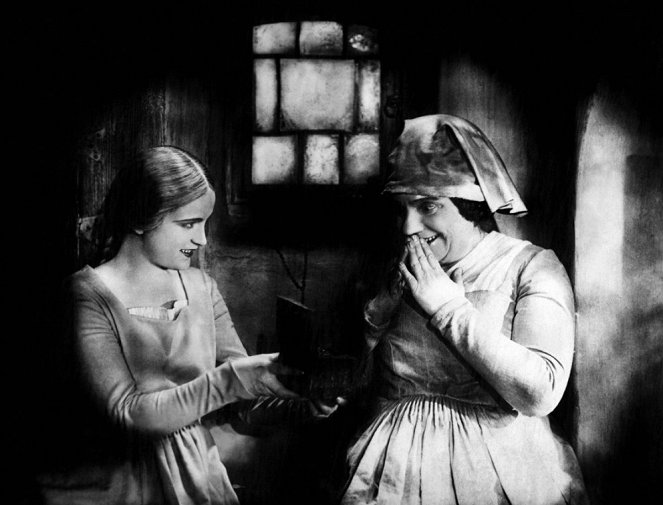Réalisation:
Friedrich Wilhelm MurnauPhotographie:
Carl HoffmannActeurs·trices:
Gösta Ekman, Emil Jannings, Camilla Horn, William Dieterle, Werner Fuetterer, Hertha von Walther, Frida Richard, Eric Barclay, Emmy Wyda (plus)VOD (1)
Résumés(1)
Tourmenteur de l'humanité avec la guerre, la peste ou la famine, Méphisto considère que la terre lui appartient. L'archange Gabriel lui évoque le nom de Faust, un vieux savant, un juste dont la vie entière est la preuve que la terre n'est pas totalement soumise au Mal. Méphisto promet de détourner de Dieu l'âme de Faust. « Alors la terre sera tienne », promet l'archange. Dans son village décimé par la peste, Faust désespéré trouve un grimoire lui permettant d'invoquer le Diable, et il signe avec lui un pacte de 24 heures pour sauver les malades. Mais les villageois réalisent que Faust n'est plus le même et veulent le lapider. En proie au suicide, Faust accepte une nouvelle proposition du Diable : retrouver sa jeunesse en échange de son âme... (Films sans Frontières)
(plus)Critiques (4)
F. W. Murnau truly found himself in horror and directed films in it that are unforgettable and can still have a profound impact on the viewer even after years. Here, there are such terrifying scenes that they are rarely seen today. This is mainly because the creators had to work primarily with the image, so they focused on it as much as possible. And it shows. It shows a lot. If you overlook the fact that it's something old, that it's a silent film, its horror remains forever.
()
I stood by my three stars the whole time because of the miscast character of Mephistopheles (who just reminded me of Postránecký here) and the skipping of the storyline from depressing horror to almost romantic comedy, but the depressing ending and the kiss at the border decided everything... yeah we’re romantic souls -) Nosferatu is still the best though
()
An example of German expressionism in all its glory. Monumental sets incorporated into the narrative, psychologising of the characters by means of expressive lighting, the actor’s body as a visual element that creates meaning, and strangely deformed set pieces serving to set the mood. Despite the advanced technical level, with the occasional somewhat exhibitionistic use of tricks, most of my attention was focused on Jannings’ Mephisto. He not only controls the fates of the characters, who – typically for expressionism – lose control over their own decision-making (the unforgettable scene in which Mephisto uses his cape as a theatre curtain), but also masterfully rules over the whole film with his lively eyebrows. He set a heretofore unsurpassed benchmark for assessing the charisma of cinematic devils. First by Kyser in pre-production, drawing from German fairy tales, and during production by Hoffman, drawing from the legacy of German romantic painting, romantic motifs were amplified beyond the scope of Goethe’s play, which is forcefully evident in the one-word climax, whose pathos is nothing to laugh at, as it fits seamlessly into the overall opulence of the film. Probably no one would have come up with a more universal and more urgent message and it is difficult to think of one today. Contemporary viewers would scorn such simplification in a modern epic. Here, however, the poetic point perfectly tops off a great story told in grand style. In my opinion, Murnau succeeded in his attempt to transform “home-grown” material into a global spectacle. 85%
()
Murnau's final German film is a beautiful affair. It was seemingly archaic at the time of its creation, but in fact it is excellently relevant then and now. It is both playful and evil. Formally, it is so creative that you have to expect some other great special effect or at least a surprising composition in every scene. This spectacular experience is an example of the collective work of an extraordinarily talented team of people, many of whom Hollywood was already waiting for almost immediately, while the others got extraordinary European work for many years to come. The name amounts to a concept and a strong story in its own right. Jannings' Mephisto is royalty in every gesture and facial expression, complete with the best costumes. Fuetterer's archangel is a capable second to Jannings' kingship. Ekman's title character is the interpretation to which all other transcriptions are always compared. Horn's Margaret is not just a symbol of humiliated virtue, but a real person full of hope, who faces only pain and death. Dieterle's Valentin is a great guy. If I had to give an example of a film that is meant to open eyes where the only synonym for silent film is the unflattering idea of the silent comedy, I would definitely recommend Faust.
()


Annonces